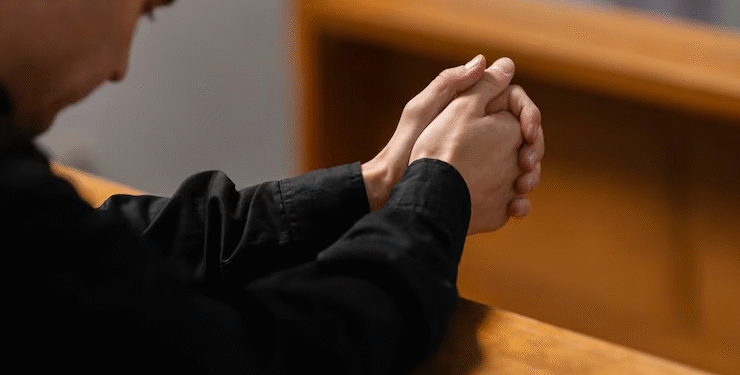You have been clinging–perhaps to control, fear, or resentment, or simply the burden of trying to do everything yourself. But suppose you did not have to carry it all?
Reciting the Third Step Prayer is not a mere formality- it is a time of surrender. It is the point at which you cease struggling with life and begin to let something bigger take the lead. This is a prayer that will enable you to take a step back, loosen your hold and relax your control over the idea that you must do everything on your own.
There is strength, clarity and peace unexpectedly found in that surrender. When you feel you are ready to relax your grip and get free, the Third Step Prayer can be your turning point.
Let’s understand in detail how the 3rd step prayer can help let you go.
1. Surrendering Control
While reciting the Third Step Prayer, you are practicing the act of surrender. This does not mean giving up; instead, it means relinquishing the exhausting attempt to manage everything, especially the things that are unmanageable.
During addiction, you probably attempted to manage your drinking or drug use; however, with every effort to gain control, life only became more chaotic. By surrendering yourself to a Higher Power, you are making the choice to release that burden.
Many in recovery openly admit that the 3rd step prayer AA is the turning point for them, the moment they begin to trust something bigger than themselves. It dawns on you that control was never really yours to wield, and in surrendering, there’s unexpected resilience waiting to be discovered. The prayer aids you in shifting your perspective from struggle to spiritual trust.
Rather than fighting the same overwhelming cycle filled with incessant fear and failure, you begin to live from a new paradigm of steady acceptance. Each attempt to let go gets easier, and with each repetition of the prayer filled with intention and sincerity, the act becomes less terrifying and more liberating.
2. Letting Go of Ego
Reciting the Third Step Prayer allows you to step out of your ego, the part of you that desperately attempts to control everything, including fixing things all by yourself.
During addiction, the ego often whispers that help is not needed, that one can manage it all by oneself, and that seeking help is a sign of weakness. But the more you cling to that belief, the more chaotic things become. This form of prayer goes against that mindset.
By turning your will to a higher power, you willingly decide to let go of self-will and pride. You acknowledge that your approach hasn’t worked and that, indeed, it is not failure but rather freedom. Without ego, you open the door to healing, humility, and a connection with a greater power.
3. Building Trust
Saying the Third Step Prayer is a step of trust—putting your faith in a higher power instead of your own limited resources. In early sobriety, the unknown can feel debilitating. You may ask yourself if you will relapse if you possess any real strength, or what your life will be without substances hovering over you. These thoughts are a source of fear, and fear can immobilize you.
However, with the repetition of this prayer, you are able to remind yourself that it is okay if you do not have all the answers right now. You are in the process of learning how to trust a system that works on a daily basis. You begin to notice that you are not truly alone and that something more powerful than you are actually guiding you, even if you cannot see the whole journey at this moment.
4. Creating a Daily Practice of Release
By incorporating the Third Step Prayer into your daily practices, you are allowing yourself a way to let go mentally, emotionally, and spiritually. With every recitation, you are giving yourself a reminder to let go of the burdens of the past and future worries.
During the recovery phase, it is common to feel overwhelmed by anxiety, guilt, or an overwhelming urge to micromanage every detail. However, through this prayer, you begin to create the respite to simply pause and breathe and relinquish control to your Higher Power. It becomes a daily practice of trust and surrender beyond just words. You no longer have to try to bear every burden, and you certainly don’t need to fix everything by yourself.
5. Shifting Focus to Service

When you say the Third Step Prayer, you’re not just asking for help—you’re also asking to be of service. The line “that I may better do Thy will” invites you to move beyond self-centered thinking and focus on how you can contribute to others. During addiction, your world may have revolved around your own needs, pain, and survival. Recovery offers a chance to change that.
By letting go of the constant focus on yourself, you begin to see the needs of others and how your experience can help them. Saying this prayer reminds you that your life now has a purpose beyond just staying sober—it includes being useful, compassionate, and present.
Service doesn’t have to be grand; even listening to someone at a meeting or offering encouragement matters.
Conclusion
As you walk the path of sobriety, the Third Step Prayer can become a steady anchor in your daily life. It helps you release control, quiet your ego, build trust, and find peace through surrender. Each time you say it, you’re reminded that you don’t have to face recovery alone. You’re invited to live with purpose, humility, and a willingness to serve.
Let this prayer be more than words—let it be a practice that grounds you, guides you, and gently leads you forward. In letting go, you make space for healing, growth, and the freedom sobriety truly offers you.













